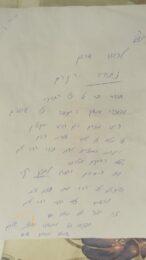Netivyah News
Last updated July 25, 2024
Yehuda Bachana: Religious zeal & the ‘covenant of peace’ [Parashat Pinchas 2024]
Last week ended with sirens and brought us just another step closer to an additional (& quite unavoidable) war in this region of the world. For over 9,5 months, residents of the Gaza envelope and the North have been living in hotels. Last weekend alone, 120 rockets and UAVs (!) were fired into Israel, and for the first time a Houthi-launched drone reached Tel Aviv and killed the 50-year old Yevgeny Ferder, who died from a direct hit to the hostel he worked at.
Leading up to that same weekend, a few amazing ladies from our kehilla prepared and supplied an IDF-unit with a generous Shabbat meal, that included delicious homemade chicken, meat balls, several salads, cake and other baked goods. They then delivered this Shabbat meal to the stormy North in our kehilla van. Hoping to return back home in time for their own Shabbat celebration in Jerusalem, there was a great delay due to one of the greatest rocket and UAV attacks from Southern Lebanon towards Northern Israel.
They stopped to hide in a local shelter near the road, and then also waited for the soldiers to finish their mission until much later, after which they met at an alternative meeting point due to rocket fire... Needless to say that - especially in these dire times - we very much pray Messiah returns soon and in our days!
The meeting between the congregational members and the soldiers was truly touching and heart-warming. I believe that both sides were blessed a lot. Our women worked very hard for a few days in a row to prepare and deliver this meal, and felt privileged to bless soldiers and care for them. In return, the soldiers feel they are loved and cared for. That they aren’t forgotten. This support is tangible and goes much beyond this home-y and delicious Shabbat meal.
Lately, we are being attacked more severely by Yemen (the Houthis) and Lebanon (Hezbollah). Both groups function directly under the ‘head of the snake’, Iran. These attacks from Iran are a direct result from the feeling that the Gazan terrorist organization Hamas is weakened. Iran attempts to prevent Hamas’ collapse, by attacking Israel at different borders (as to keep us ‘busy’).
Hamas moved underground and mostly uses pinpoint strikes through unorganized guerilla warfare, while also attacking Israel with rockets fired from within their Gazan tunnel network. Hamas’ main point of interest is their own survival and their ability to recover, so they can regain control over Gaza in the near future.
Behind the scenes, Iran is pulling at the strings of the Houthis in Yemen, to manage their war of attrition against Israel, aimed to wear our military out at several borders (alongside this long war that has flooded our country with fear, damage to homes and nature, loss of lives, unlivable living areas and broken rhythms for those who serve or are evacuated).
Without a doubt, we are living in very challenging times in Israel, while both our & our kids’ existence (our future!) is literally under fire. As a country, we are very much in need of prayer and strong support, to truly know and feel we are not alone in this long and weary storm, and to be strengthened by our friends stand with us and don’t allow us to fall nor break. Friends who strengthen us, our friendship & partnership.
We need all of our believer friends to stand firmly with us in prayer and for you to truly voice your support. Please dedicate daily prayer - even if shortly - to lift the State of Israel up in prayer. Thank you!
The war and regional conflicts are connected to religion. The Middle East (in general) and Israel (specifically), encounters religious fanaticism by those who aim to hurt those who are different.
Parashat Pinchas focuses on religious extremism and forces us to discuss this problematic and controversial subject. The idea of religious zeal scares us, and is rightfully defined by the Cambridge Dictionary as: “extreme beliefs that may lead to unreasonable or violent behaviour”, that disregards the value of others.
That being said, Parashat Pinchas makes up a rich mosaic of topics, beginning at the point where the last Torah Portion ended at the description of the Israelite camp at ‘Shittim’, some 10 kilometers North-East from the Dead Sea. That was the place where the daughters of Moab tempted the Israelites into idol worship:
“So Israel yoked himself to Baal of Peor. And the anger of the Lord was kindled against Israel.” (Numbers 25:3)
The result was terrible: a plague that cost the lives of 24 thousand! This plague only stopped when the priest Pinchas, son of Eleazar, killed the tribal leader of Simeon together with the daughter of a noble Midianite.
This Torah Portion is named after the very same priest, and begins with Gods reaction to Pinchas’ deed. Then follows a discussion on a variety of topics, from the census of the tribes and the division of the land according to the size of each tribe.
The story of the daughters of Zelophehad and the inheritance rules for daughters also appears this week. Furthermore, we read how Moses appoints Joshua to be the next leader. Then, within the mention of several sacrifices, we encounter the Biblical feasts: Shabbat, Pesach (Passover), the Feast of Firstfruits (Shavuot), the Feast of Trumpets, the Day of Atonement and Sukkot. And so, Parashat Pinchas truly is a rich Torah Portion.
Let’s return to the beginning, where a priest (and a member of the Tribe of Levi), kills someone from the Tribe of Simeon. This brings us back to tribal leaders themselves. Jakob’s sons, Simeon and Levi, are violent and zealous brothers, having avenged their sister Dina by committing the Shechem massacre.
This scared Jakob so much, that he disinherited them. This event reminds us of Joseph in Egypt, and raises the question whether it was mainly Simeon who got insulted and jealous of his younger brother Joseph, up to the point where Simeon became the deciding factor for his brothers to even consider killing Joseph in Dotan (Genesis)…?
Eventually, the brothers decide to ‘only’ sell Joseph into Egyptian slavery.
This topic of ‘religious zeal’ touches us, as Israeli believers, as we encounter the toxicity of religious fanaticism from up close on a daily basis. Religious aggression and persecution are hardships that our kehilla and Messianic non-profit organization have endured from the very beginning in the 70’s.
Extremist burnt down our first meeting place and tried to burn down our current congregational building, and tried to hurt us in different and even in strange ways.
Religious zeal and fanaticism exist when we forget that God is the Creator of the whole world, and that every human being (without exception) is created in God’s image and likeness. God is the God of the entire world, creation and creatures. When people think of themselves as ‘God’s protectors’, that thought brings out the absolute worst in them.
We mentioned that Parashat Pinchas begins with God’s reaction to Pinchas’ deed, and how did He react to this jealousy?
“Phinehas the son of Eleazar, son of Aaron the priest, has turned back my wrath from the people of Israel, in that he was jealous with my jealousy among them, so that I did not consume the people of Israel in my jealousy” (Numbers 25:11)
At the end of verse 12, we come across the phrase ‘covenant of peace’, that intrigues traditional scholars who try to understand and explain it (and the reason why there is extensive commentary on it). One of the main explanations is the awareness that we - as a People and as a group – shouldn’t adopt a jealous, aggressive or even a fanatic ideology.
Many understand the expression ‘covenant of peace’ to be an answer, or even a requirement from God to Pinchas. A demand for the jealous one to choose a more peaceful way. And so, our Heavenly Father says: ‘the aggressive jealousy was correct at the time; however, it’s forbidden to turn religious zeal into a way of conduct.’ Many scholars see this reaction by God as a declaration that the world should – and even must - function peacefully.
The lowest step in the life of a godly person (which is important, too) is religion. However, religion without faith, has the tendency to lead to dangerous extremism. And that’s what we see today, in the daily hatred the world encounters. Contrary to religion, faith causes our life to be a joyful service to God.
The highest level is love. Paul teaches us that:
“Love is patient and kind; love does not envy or boast; it is not arrogant or rude. It does not insist on its own way; it is not irritable or resentful; it does not rejoice at wrongdoing, but rejoices with the truth. Love bears all things, believes all things, hopes all things, endures all things. Love never ends.” (1 Corinthians 13:4-8)
The religious framework is meant to set boundaries and safe-guard people, as well as their identity. Faith leads us to serve God with joy. It’s possible to believe without religion. Faith is greater than religion, and isn’t limited by the boundaries set by religion.
The greatest of all is love, which is why Yeshua sums up the entire Word of God to love.
“So now faith, hope, and love abide, these three; but the greatest of these is love.” (1 Corinthians 13:13)
Please join us in prayer for:
Roeh Israel, our kehilla
- the health of some of our members, and for Joseph and Marcia Shulam in particular
- a few of our members have babies on the way. We rejoice with them and bless these pregnancies and growing families!
- yesterday (Thursday) we went out for a kehilla picnic in the mountains near Jerusalem. We baked pita on a taboun and discussed the Lord’s Supper, as well as a poem about Yeshua by Prof. Yair Zakovitz. We love such opportunities for fellowship together as a community, where we relax, enjoy and talk together in our beautiful local nature.
hamotzi
“Dear Netivyah,
Thank you very much for all you give. And for the help you give us every 2 weeks. We would come every Wednesday and receive a full and generous package of chicken, fish, vegetables, and dry goods. Thank you and all who do this work! You receive us with a warm smile. Continue to be the amazing people you are. Thank you very very much! From S. and R.”
Israel is at War
- Last Thursday we supplied a Combat Engineering unit with helmets and rechargeable batteries that will help them during the war. We thank all of our supporters, who continue to be a part of this mission to assist as many IDF units as possible. It’s important to mention that many soldiers still lack the proper equipment.
For more information about our work and support for soldiers,
click here
Shabbat shalom!
Yehuda and Lydia Bachana
Netivyah and the Roeh Israel congregation

